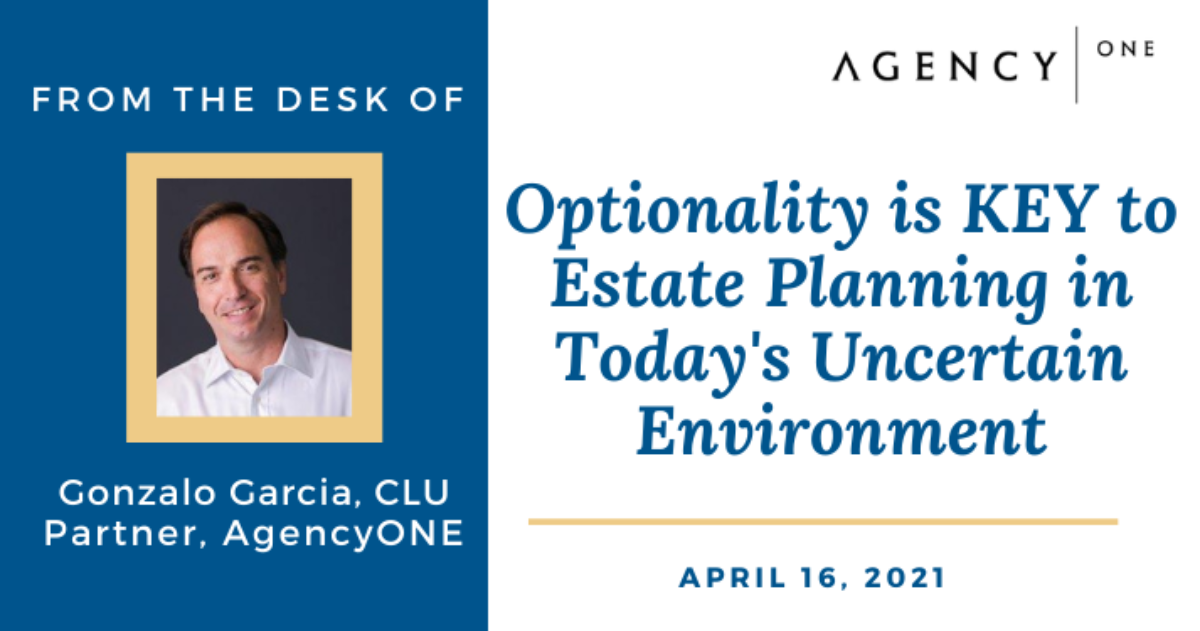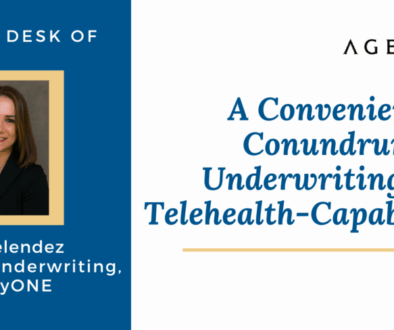Optionality is KEY to Estate Planning Today
During the last several weeks I have assisted quite a few AgencyONE 100 advisors with alternative estate and gift tax planning options to present to clients who are concerned with many of the Biden Administration tax proposals. Advisors and clients know that optionality is key to estate planning when the tax environment is so uncertain. We have discussed these issues at length in many of our recent ONEIdeas and our past webinar series. (The Election is Over – Now What with Alan Brown, JD, & Randy Zipse, JD, AEP & The Tsunami is Coming – The Wealth Tax with Joe Ross, ChFC, CLU, CRC, AIG Financial).
I have been in this business for almost 40 years, and I have never seen a more challenging OR a more opportunistic environment at the same time.
A Review of the Current Planning Environment
Since the Tax Cut and Jobs Act (the Trump Tax Act) of 2017, wealthy clients have enjoyed a unified estate and gift tax exemption that doubled from the prior $5MM per individual ($10MM per couple) in place and left by the Obama administration (subject to annual cost of living adjustments). The current (2021) limits have increased to $11.7MM per individual and $23.4MM per couple. As a result of these very high limits, less than 1% of U.S. estates are subject to an estate tax. Individual and joint taxpayers can give these amounts over their lifetime to trusts or directly to descendants without a gift tax due.
couple) in place and left by the Obama administration (subject to annual cost of living adjustments). The current (2021) limits have increased to $11.7MM per individual and $23.4MM per couple. As a result of these very high limits, less than 1% of U.S. estates are subject to an estate tax. Individual and joint taxpayers can give these amounts over their lifetime to trusts or directly to descendants without a gift tax due.
Estate Planning Strategies for Wealthy Clients
 The simplest estate planning strategy for most wealthy clients, assuming they have other assets available to live on, has been to simply move (gift) large amounts of money (up to $23.4MM) downline generationally (children\grandchildren) or to make gifts to trusts. Life insurance owned by a trust (outside of the client’s taxable estate) has typically been part of the financial equation, depending on the composition of the estate and the need for liquidity or leverage. Additionally, clients can make annual gifts based on the annual exclusion amount per beneficiary of $15K ($30K per couple) without any gift tax due or informational IRS filing requirements.
The simplest estate planning strategy for most wealthy clients, assuming they have other assets available to live on, has been to simply move (gift) large amounts of money (up to $23.4MM) downline generationally (children\grandchildren) or to make gifts to trusts. Life insurance owned by a trust (outside of the client’s taxable estate) has typically been part of the financial equation, depending on the composition of the estate and the need for liquidity or leverage. Additionally, clients can make annual gifts based on the annual exclusion amount per beneficiary of $15K ($30K per couple) without any gift tax due or informational IRS filing requirements.
COVID, Interest Rates, & Planning
As COVID-19 gripped the economy, interest rates continued to plummet. They hit historic lows, while clients of means continued to enjoy a booming stock market and increases in other assets. In fact, CBS News reported on March 31st, 2021 that the world’s 2,365 billionaires enjoyed a $4 trillion boost to their wealth during the first year of the pandemic – a 54% increase!
In fact, CBS News reported on March 31st, 2021 that the world’s 2,365 billionaires enjoyed a $4 trillion boost to their wealth during the first year of the pandemic – a 54% increase!
This has triggered an outcry by many to tax the wealthy. This idea is supported by two-thirds of Americans, according to the CBS article. While it may prove elusive, many pundits believe that something will happen on the tax front that may include:
- raising taxes on incomes over $400,000;
- reducing the estate and gift tax exemptions to $3,500,000 per taxpayer;
- decoupling the estate and gift tax exemption; and
- limiting lifetime gifts to $1,000,000.
This poses a quandary to wealthy individuals. Should they “bite the bullet” and gift assets to trusts or outright to their heirs under the current tax regime.
Optionality- Premium Financing Strategies
One of the often-overlooked strategies for purchasing life insurance in trusts brings us back to the low interest rates mentioned before. There are two common financing strategies: commercial premium financing and private loan\sale arrangements that increase options in planning.
Commercial Life Insurance Premium Financing
 This involves banks and other financial institutions that lend money to families or trusts for the acquisition of permanent life insurance to cover estate tax or other liquidity needs. The primary reason for this is if a client’s assets are earning more returns than the cost of financing. This creates a positive spread or arbitrage. Another very important reason to consider is if highly appreciated assets need to be liquidated to pay life insurance premiums. A capital gains tax would be created at the time of sale.
This involves banks and other financial institutions that lend money to families or trusts for the acquisition of permanent life insurance to cover estate tax or other liquidity needs. The primary reason for this is if a client’s assets are earning more returns than the cost of financing. This creates a positive spread or arbitrage. Another very important reason to consider is if highly appreciated assets need to be liquidated to pay life insurance premiums. A capital gains tax would be created at the time of sale.
If a trust can borrow money at 3% and leave assets invested in equities, family businesses, real estate holdings, etc. earning 6%, then there is a natural positive arbitrage. The risk is if the cost of borrowing exceeds, for any extended period, the returns on the portfolio assets.
My gut tells me that the United States is likely in a protracted low interest rate environment. This is caused by the weight of the U.S. National Debt, which has and will continue to grow due to pandemic relief, and the proposed infrastructure investment, which are currently being discussed. I do not believe that the Federal Treasury will increase the cost of borrowing any time soon. The ONLY way out of this quandary is to increase taxes in a meaningful way, which is not popular. The tax increase subject further highlights the importance of “wealth tax” planning.
Commercial premium financing is a complex area and requires significant expertise in modelling, stress testing, and a sound exit plan. After all it is a bank loan which needs to be paid back.
Private Financing or Private Sales
Did you know that you can lend money or sell an asset in exchange for an interest-bearing note to a family member (or trust) and that the IRS will dictate what interest rate to charge? Currently, for a short term loan of 3 years or less the prescribed interest rate by the IRS is .12%, for a mid-term loan of 9 years or less the rate is .89%, and for a long-term loan of greater than 9 years the rate is 1.98% (IRS rates for April 2021).
for a short term loan of 3 years or less the prescribed interest rate by the IRS is .12%, for a mid-term loan of 9 years or less the rate is .89%, and for a long-term loan of greater than 9 years the rate is 1.98% (IRS rates for April 2021).
If you could sell an asset that is earning 10% to your trust in exchange for a note paying you 1.98% and you knew that all growth over the “hurdle rate” of 1.98% would forever be outside of your taxable estate, would you? If your trustee could reinvest the excess cash flows into other assets and diversify the trust portfolio, would that make sense?
Private financing arrangements can take a variety of forms. As noted, they can be outright private loans, sales in exchange for notes or in the form of a loan regime split-dollar arrangement. All of these are sophisticated tools that require a well-versed tax attorney and\or accountant.
AgencyONE Advanced Markets
The AgencyONE Advanced Markets team has developed a comparative presentation and analysis that can be customized for your clients. The presentation considers:
- asset\portfolio composition;
- liquidity, tax, and cash flow analysis;
- comparisons to outright gifts; and
- commercial premium financing and private financing strategies.
This presentation has been used for a number of clients and has led to some very significant planning. Again, optionality is the key to estate planning today when the environment is so uncertain!




